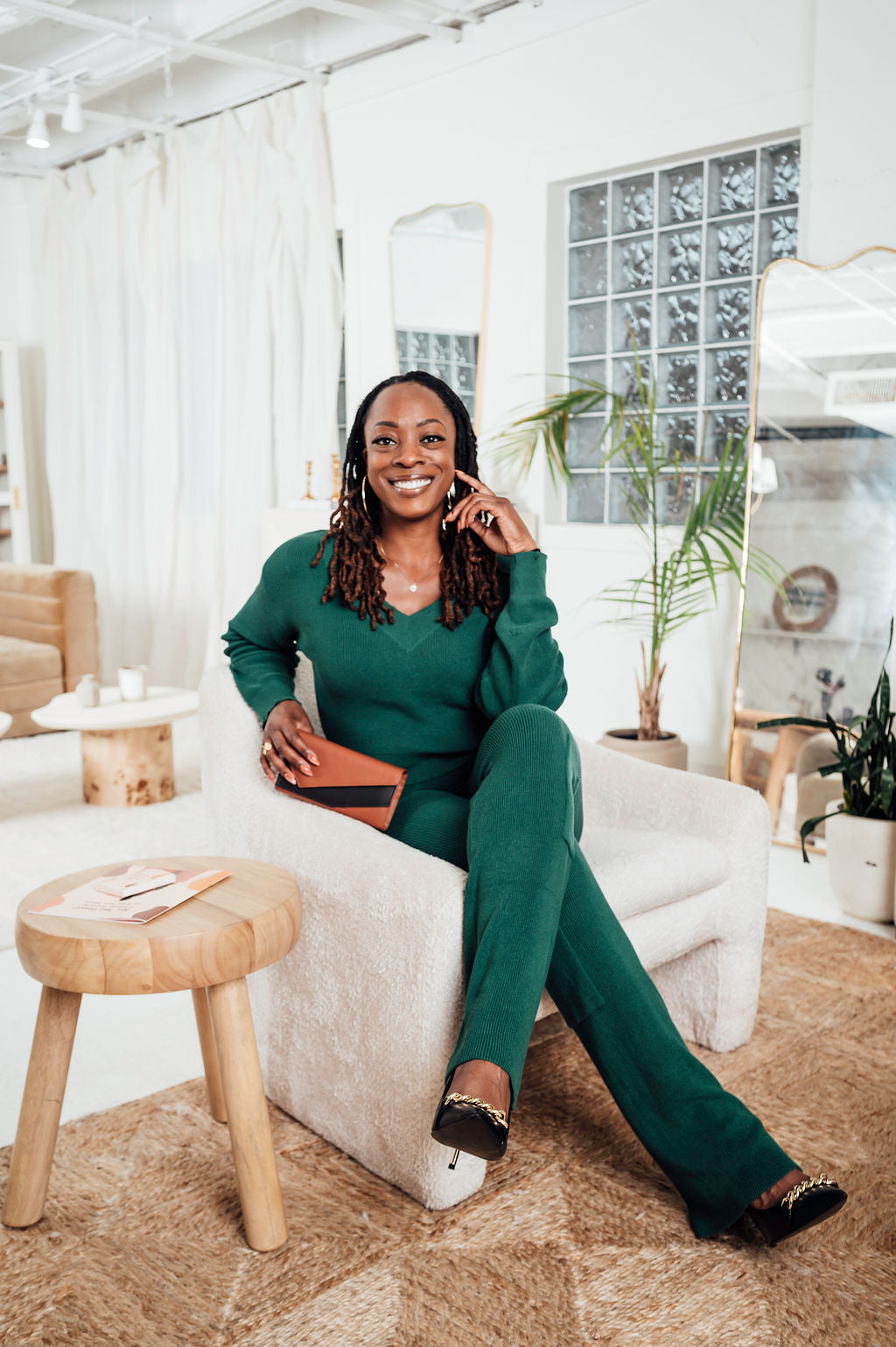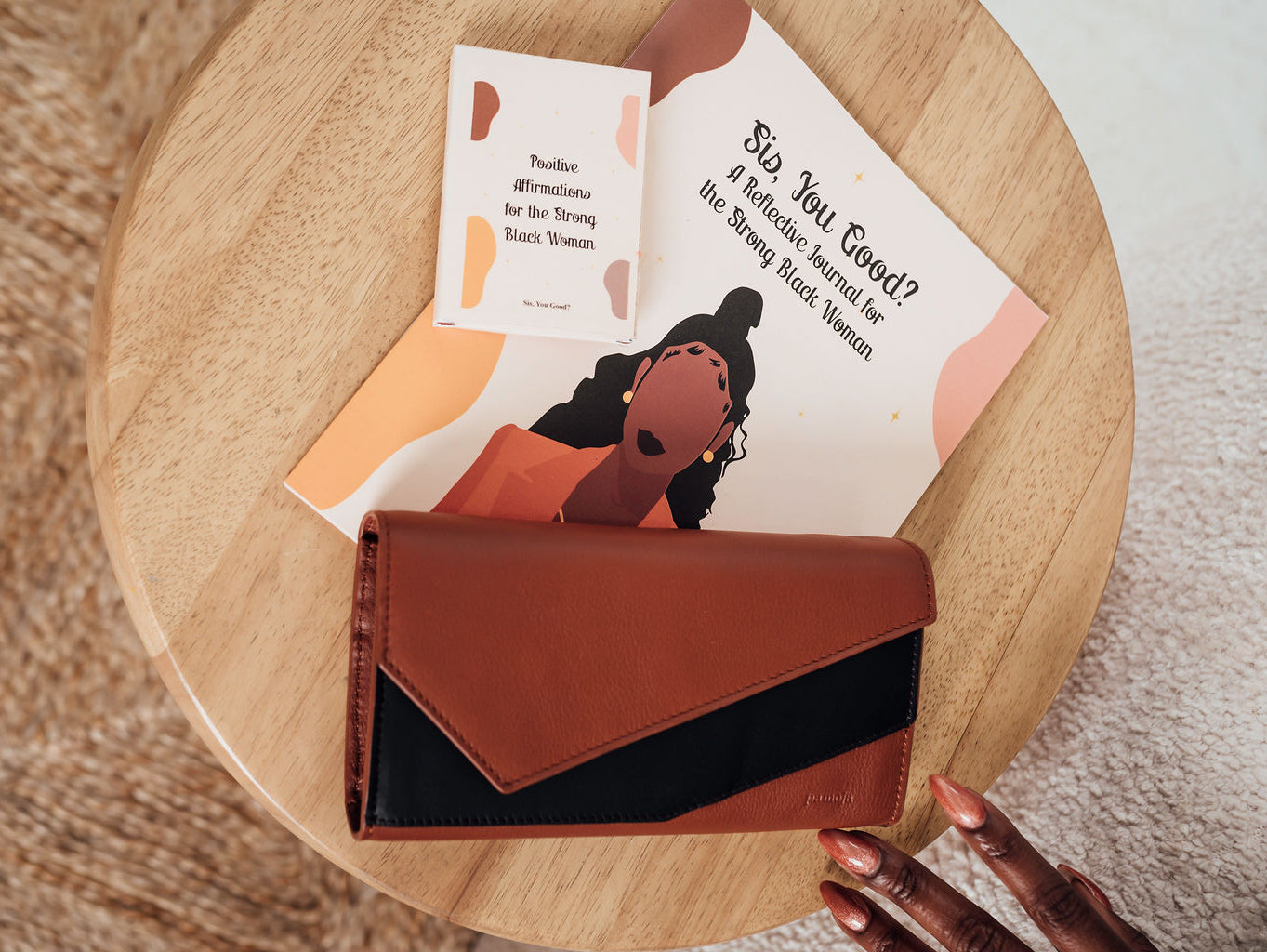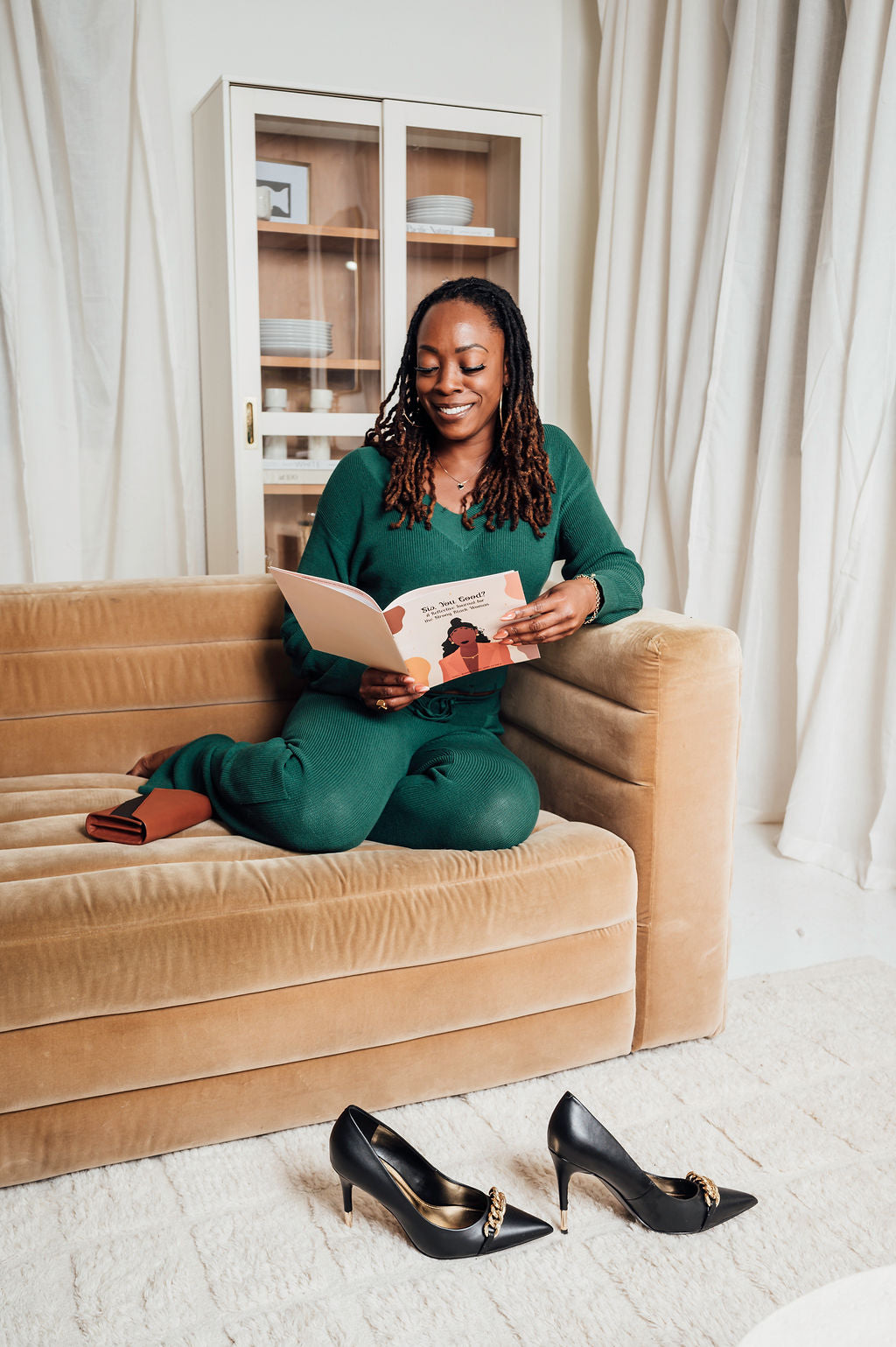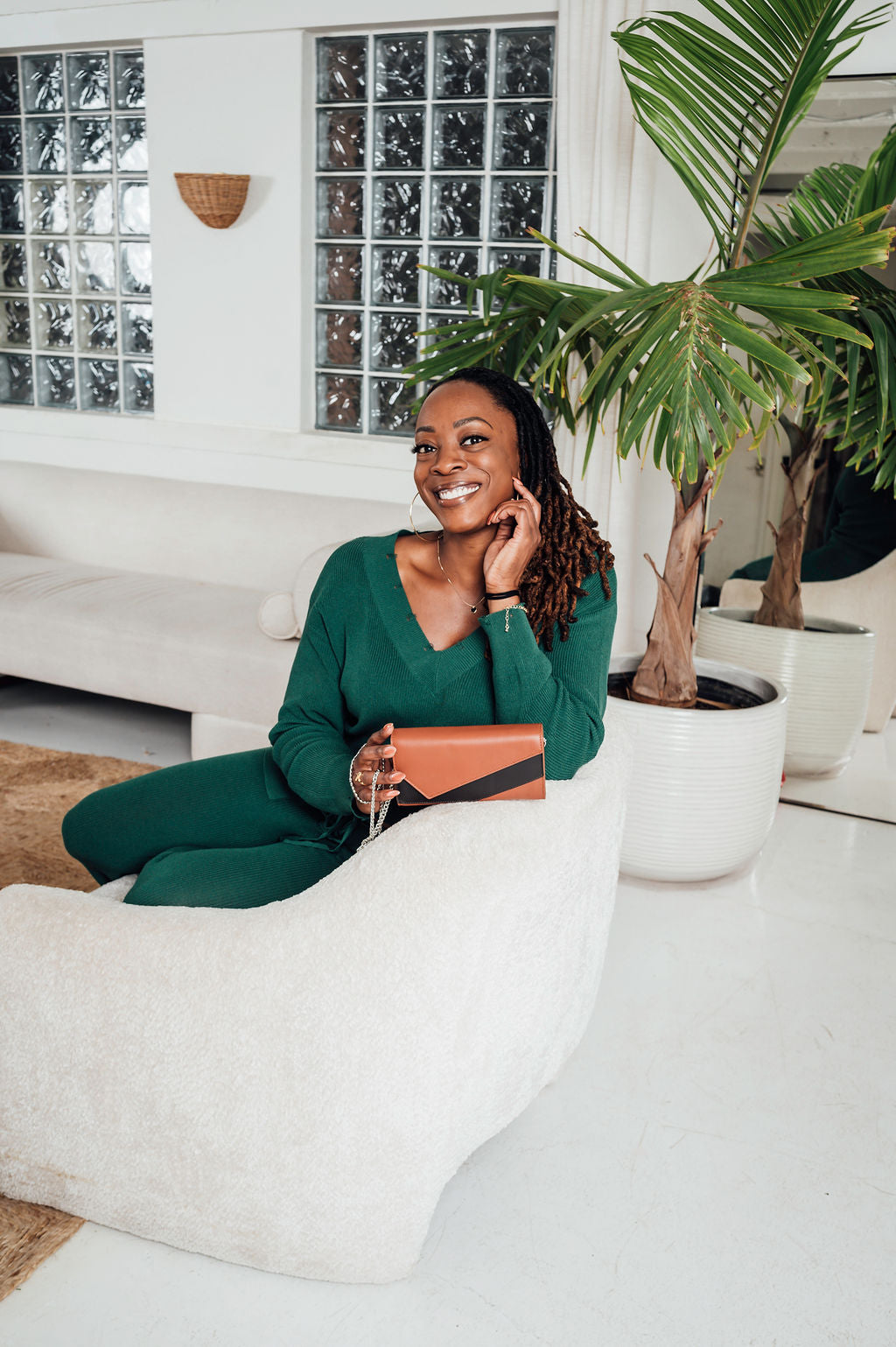16 | Kamilah Thomas: A Conversation on Resilience and Self-Care

16 | Kamilah Thomas: A Conversation on Resilience and Self-Care
A licensed mental health therapist, motivational coach, and women empowerment advocate, Kamilah Thomas shares so many great insights on self-care and total wellness, highlighting the interconnectedness of mental, emotional, and physical health.We also dived into the characteristics and struggles of The Strong Black Woman.
Throughout our conversation, Kamilah shared practical tips and advice for prioritizing self-care and maintaining well-being, from deep breathing exercises to the power of stillness and mindfulness.
Overall, this episode was a heartfelt and empowering conversation, filled with valuable insights and encouragement for anyone on their journey to personal growth and fulfillment. Join us as we navigate the path to success and well-being, one step at a time!
Topics Covered:
- My transformative shift into private practice as a therapist
- The Strong Black Woman
- Prioritizing total wellness for sustainable success
- The practice of deep breathing to reduce anxiety
- The surprising things you'll learn about yourself by sitting in silence
- Embracing life's unpredictability

- My transformative shift into private practice as a therapist
- The Strong Black Woman
- Prioritizing total wellness for sustainable success
- The practice of deep breathing to reduce anxiety
- The surprising things you'll learn about yourself by sitting in silence
- Embracing life's unpredictability
Explore Our Podcast
Transcript
Kamilah Thomas: as we take on more and more and more, that also means that things are gonna have to come off, right? Because so much is given, much is required.
And so the ways that we may have traditionally grinded and hustled and do certain things. How sustainable is that? And so my goal now is to help, ambitious entrepreneurs still shine bright and be successful without burning out. Right. So really help them be able to prioritize their wellness because self care is a necessity for sustainable success.
Stephanie: I am Stephanie Evans and this is Diaries of a Modern Trailblazer. Take note of the journey and be inspired to forge your own amazing path.
Today, I have Kamilah Thomas, licensed mental health therapist and speaker with us.
Kamilah Thomas: Hello, everybody. Thank you so much, Stephanie, for having me here today.
Stephanie: Thank you so much for being here. So, how do you feel today?
Kamilah Thomas: I feel really good. We had an amazing shoot. I'm very, very grateful to be able to be rocking one of your bags.
So, the day started off perfectly.
Stephanie: I know, right? I mean, despite the weather, it's still an amazing day. So what I like to kick it off with is really knowing the context of who you are and your backstory. So give us a little bit more insight into who you are.
Kamilah Thomas: Oh, goodness. Um, I am a Thomas girl. I am the oldest of three girls.
I am a Virgo. If that tells you anything. I'm also a licensed mental health therapist. I do motivational and women empowerment coaching. I am a lover of fitness. I am a lover of travel.
Stephanie: How did you become a mental health therapist?
Kamilah Thomas: That was definitely a journey, definitely a journey. So I initially wanted to be an attorney. My undergraduate degree was in criminal justice and psychology.
In addition to having a love for the legal field and law, I also have always been interested in just how the mind works, why people do what they do. What motivates them. And then just different mental health disorders as I was learning about them in my psychology classes was really interesting to me.
And so after graduating, um, I was a juvenile probation officer while I was waiting to study for the LSAT. And that really just opened up my eyes of, just the psychosocial challenges that people have that lead them to make certain decisions.
Do people become who they are based on nurture versus nature or a little combination of both? From there, unfortunately, I had some really traumatic things happen to some kids on my caseload. And so that really pushed me in a direction to want to be more preventative, to be more in a helping role versus in a punitive role.
And I'm competitive, right? So after undergrad, I noticed a lot of my peers went on to get master's degrees. And so that was kind of how I fell into social work instead of going into law. Um, and from there it was really just, I will say a spiritual journey because I've done everything from working in RTCs, psychiatric hospitals, nonprofit organizations, government agencies.
And then in 2018. There was definitely a very, um, transformational period in my life, and this is why I say God intervened because I made a total switch into private practice, which is what I've been doing full time for the last six years. In that role, I really had the opportunity to grow as a professional, just to realize different ways for me to take my skill set and my previous years of experience to be able to do different things beyond therapy.
So whether it's speaking engagements, coaching, clinical supervision, being a mental health consultant, um, and so now I wear a lot of, a lot of different hats in the field of mental health.
Stephanie: How did you make that shift into the private practice in 2018?
Kamilah Thomas: God was very disruptive in my life. Very disruptive in my life.
In grad school, we weren't taught anything about private practice. It's all about how to work for other people, right? Hospitals, schools, government. I just knew that in all my years of experience, I just wasn't really feeling satisfied. I felt like I was called to do more and I just started meeting other people and they happened to be therapists, particularly in private practice that started to pique my interest.
And then I just started receiving a lot of signs from God, literally where I would hear his voice. I would meet people and. Randomly, right? There would be some kind of message or something that they said.
The final point where I was like, okay, God, I hear you, my sister and two friends, we went to Kenya, Africa. And when I tell you, I don't know if it was being there in the motherland, but there were just so many more confirmations. To have faith and not fear and to step out and trust yourself and do something different. And that was what I did. And so from there, I think once you start moving other doors and opportunities will open up for you.
And so that's just what has happened in the last six years.
Stephanie: And there's no looking back.
Kamilah Thomas: No looking back. No, ma'am.
Stephanie: What would you say was the most challenging part about taking that leap of faith?
Kamilah Thomas: Going against everything that I knew or was told would be Success and what the American dream was. Um, I was raised in like a Huxtable kind of household. Both parents are still married to this day and they will actually celebrate their 50th wedding anniversary this year.
Stephanie: Oh, congrats to your parents.
Kamilah Thomas: Yes, absolutely. Goals.
And so we were just raised — you know, you go to college, you get that degree, you work, climb the corporate ladder, get married, have kids, you get a house. And that's what success looked like.
I didn't have anyone in my family that were entrepreneurs. I didn't have friends who were entrepreneurs.
And so I think that was the scariest thing because I was used to consistent paycheck, um, being very clear on what the expectations of, of my job was. Um, and so to do something different, um, I think my parents were supportive, but a little sideeye, like, okay, girl, um, We're going to keep your room upstairs just in case things don't work out.
So I think I definitely was blessed to know that there was a safety net. But I think the biggest thing was just doing something different that I hadn't seen before and I wasn't taught.
Stephanie: I love that for you. And, you know, goals for me
Before we hopped on this podcast, and as we were planning ahead conversations, you mentioned Strong Black Woman, and I want to tap into that.
What does that mean to you? And why do you place such an emphasis on it?
Kamilah Thomas: So, the Strong Black Woman, there's actually five characteristics. There was research done several years ago. And so, some of the characteristics looks like when there is a difficulty with someone being able to ask and receive for help.
There's a tendency to have to always manifest this sense of being strong, no matter what. Difficulty being vulnerable with other people. Um, and so I think those are things that I resonated with, but maybe in a different way than some other women.
I mentioned before that I was a Thomas girl.
And that was something that I just heard. My dad would say that all the time. You're a Thomas girl. You're a Thomas girl. And you know, it wasn't really clear on what that actually meant.
Stephanie: Yeah.
Kamilah Thomas: But as heard it and internalized it, it was almost not that you're better than but there are just different expectations for you and people in this family. It's just certain, um, unspoken rules of things that you just don't do. That you are a leader, that you're not a follower. While my story didn't come out of a need for struggle and I, it wasn't like I couldn't depend on everything. I actually was told that I can do anything. I never heard can't, um, whatever you want to do, just go after that.
And so I think for me, because I was raised to be pretty self sufficient and independent, that's just what I knew. And because I hadn't failed academically, athletically there, all the evidence said that whatever you want to do, you can do. When you set goals, no, they aren't unrealistic. No, they aren't high. They're actually achievable for you. And so I think how it's manifested, particularly, I would say, in entrepreneurship, having to learn how to delegate and how to be able to trust other people that the more I grow and take on, I can't do it all by myself.
I think also really understanding what vulnerability means and the strength in that. I saw my parents very emotionally regulated all the time. I didn't see a whole range of emotions, um, which is good that they, you know, stay cool, calm, and collected. Um, but I think it also was a challenge as You know, I was an adult and I had different emotions, feeling like I had to keep it all together.
Right? Because that was what I saw. Versus like, no, you can talk about this. You can let it out. And so, um, I think just kind of unlearning some things a little bit or what it looks like in a different capacity.
Stephanie: That's interesting. And I'm curious. You know, you being a licensed mental health therapist, what does mental health mean to you?
Kamilah Thomas: So I'm actually leaning more into total wellness, right? And our mental emotional health is a part of that. So generally speaking, our mental health is about, um, the quality in which we can express our emotions, we can deal with stressors in life. Um, are we staying balanced through, you know, Just being able to, to navigate some simple things in life.
Um, but total wellness really looks like all areas of our life and there's eight different categories. So emotional, intellectual, social, occupational, spiritual, um, social, our environment, all of those things. And so I think when I am being intentional about taking care of myself in all of those areas. Um, versus just my mental health, that's when I get to show up in the fullness of who I am, um, and can function at the best that I can.
Stephanie: Right. So it's holistic. It's not necessarily just tapping into one specific thing. Total wellness is all encompassing and everything.
Kamilah Thomas: Absolutely. But I also think it does start with our head, right? Because our mind controls everything. Um, depending on the mindset that we're in is going to make a difference, how we show up socially, right?
How productive or not we are at work— whether or not what's happening to our spirituality. I can think of times when, you know, my mental health may not have been at the best, and noticeable changes. I think that has helped me to say, okay Kamilah, you're off, right? Because I know myself well enough to be like when I'm good and when I may be struggling for some reason.
Stephanie: Yeah. I do want to dive into a little bit more of some of the work that you're doing, specifically with Black female entrepreneurs. Can you share, give us more insight into that.
Kamilah Thomas: Absolutely. So, you know, during my six year journey, um, and also just as a therapist, as I've been working with other Black female entrepreneurs, I found almost a pattern or a theme that almost mirrors some of the same things that I talked about earlier with being with Strong Black Woman.
And so I think for me, it helped me feel like I'm not alone and that there are other women who are in that same spot. Again, where there's been a history of them being pretty successful and accomplished. Other people see them as the strong person, assuming that they have all the things together. Um, but then that woman maybe not being able to receive all that she gives and pours into other people. She can definitely hold space for other people emotionally, but she may hold back a little bit herself. Being able to prioritize different competing responsibilities, particularly as we take on more and more and more, that also means that things are gonna have to come off, right? Because so much is given, much is required.
And so the ways that we may have traditionally kind of grinded and hustled and, you know, do certain things. How sustainable is that? And so my goal now is to help, ambitious entrepreneurs still shine bright and be successful without burning out. Right. So really help them be able to prioritize their wellness because self care is a necessity for sustainable success.
Stephanie: Knowing that you're in a client services based business that is focused around overall wellness, how are you ensuring that you're prioritizing your own self care? Because that can be a bit taxing.
Kamilah Thomas: Absolutely. So the helper has to make sure that she is helping herself. So, uh, one, I actually found me a new therapist, probably about a couple of weeks ago. So that's one thing that I'm doing as I'm kind of stepping into a new season, just wanting a different level of support.
Also working out, I would probably say is the number one thing that I do as well. Just for me, again, I've been an athlete, but just being able to have that physical release of whatever I have taken on, um, definitely is a relief for me.
Traveling, I would say it's another huge self care. I've been intentional definitely this year about getting back to quarterly trips. Um, it doesn't have to be anything far, but just quarterly opportunities for me just to be able to step away and recharge and regroup.
Um, I also do monthly Reiki sessions and monthly massages as well, to make sure again that I'm not holding, um, any tension in my body and my chakras and energy is, is flowing, in the way that it needs to.
Stephanie: And what are Reiki sessions?
Kamilah Thomas: So, Reiki is an ancient Japanese Eastern medicine practice. Sometimes it involves light touch, but it's really, it's a way to be able to assess and balance your chakras, which is where we, store our energy. And so we have seven chakras from, our root, which is kind of like in our tailbone, all the way to our crown, which is top of our head.
Stephanie: That's interesting. Mm hmm. Yeah, definitely need to get more information from you on that. I've heard about it, but just never really explored it. So definitely curious about that.
Kamilah Thomas: When I'm feeling off and I go, I definitely feel a lot more grounded, centered, and clear after those sessions.
Stephanie: That's cool.
You know, we're in the month of February, Black History Month, Being of African descent, and the history and context behind Us in America, um, we have a legacy of resilience and strength that runs deep in our veins. And, you know, I want to be intentional about self care, particularly in this month.
Mm hmm. What are some things that we can intentionally do now to focus on our emotional well being?
Kamilah Thomas: I think one literally just being able to breathe and realize that we don't have to hold it in and keep it together and keep manifesting this stoic strength the way that our ancestors did because, when could they cry? When could they say that they're scared? When could they say that they were anxious and depressed? And so I think now that society has a greater awareness, um, and value for mental health, hopefully that has decreased some of the stigma that used to be there for us to be able to go and talk to people who look like us.
Um, and so that's one of the things that I'm proud about, for my mental health group practice, KBT counseling & consulting is that we are a practice of black clinicians who are here to serve everyday black people who are just trying to make it through life. Not about being crazy is just all the things that we deal with having a safe space with someone, that looks like us to be able to, you know, share those things with and get a different perspective.
Stephanie: And when you say we can and should breathe, how do we do that in practice? Like, what are some practical things for us to consider?
Kamilah Thomas: Literally, deep breathing. That's one really quick way that you can reduce any anxiety and also like if you're feeling anger in that moment, right? Um your breath stays with you and so no matter where you are is something easy that you can do. One way that's helpful for me is breathing in really really deep through my nose for a count of four, holding it for a count of four, and then releasing through the back of my throat and doing that, I literally feel a tingling, soothing sensation.
So one of the things about coping skills, it doesn't mean that it actually has fixed or solved whatever the issue is in that moment, but what it does is regulate our body to be able to be in a better head space to now be able to handle whatever that stressor is, right?
When we're dysregulated and we're quote unquote in our feelings, we're normally not saying or doing the best, um, to handle that situation.
Stephanie: Literally. Breathe. Literally. Breathe in and breathe out.
And on that note, you know, that is definitely a great thing to start doing, but just thinking about the long term and like progressing, what are steps that we can take forward beyond that?
Kamilah Thomas: I would say if you've ever been considering therapy, go ahead and schedule an appointment. There's no better time than the present to be able to do that.
There's also a lot of different community groups and people, particularly here in the Houston area, who are doing different, um, community breath circles. It could be sound bowls, meditation, and so those are opportunities for us to be able to connect, again, with people who look like us, who really understand the power of mindfulness and being able to calm the body, and how really that's healing.
Um, I would also say, make sure that we're really utilizing our support system. Sometimes we have people who we call friends, call family, right? Uh, but we don't really utilize them when we really need their support. That can cause us to feel more isolated, ashamed, judged, versus if we just reach out to the people who are already there.
Stephanie: Therapy, there's been a stigma around therapy in our community. I would imagine it can prevent some people from seeking that help.
Where do you start?
Kamilah Thomas: I would say if you're in the greater Houston area, or if you're living in the state of Texas, start by calling KBT counseling and consulting, and you can find us by going directly to our website, which is www.kbtcounseling.com. You can also connect with us to learn more about different mental health tips and different content that we have either on IG or Facebook, also at KBT counseling. So there's that, right, for people who are ready to get started.
The second thing I would say is have a moment of, of just silence. My mom used to say this one thing, it was just, uh, just be still. And you would be surprised how much you can learn about yourself by just sitting in silence. Sometimes we're just so busy moving— we're consuming different things , we're on our phones. You know, we're multitasking, we're doing all the things that our body doesn't, and our mind doesn't have time to really process things.
But when we're still, when we're quiet, It's interesting the things that come to surface and that could be an indication of some of the things that we need to work on.
And I'll add to that paying attention to our body because our body keeps the score of whatever it is that we have experienced. A lot of times when we've experience trauma or difficult situations or emotions, it can be uncomfortable.
And so we don't want to address it and we suppress it and we stuff it down. But the question is, when we're doing that, where is it going? And a lot of times what happens is we are storing our issues in our bodily tissues. And so our body holds onto all of this stuff, and so whether or not it manifests into weight, excessive weight, whether or not we're noticing that there's chronic pain that we're having in certain areas of our body, particularly in the neck and shoulder areas, right, when we're feeling tense and on edge. And so our body is trying to tell us certain things.
Sometimes, though, what happens is we ignore our wellness, so then we're forced to deal with unnecessary illness. And so I would say, take time to sit in silence, to pay attention to what it is that your, you know, body and brain is trying to process, and then also pay attention to what you may be holding in your body.
And so whether it's therapy, whether it's deep breathing, whether it's meditation, whether it's working out, whether it's screaming, yelling, find a way to release it. Because otherwise we're carrying it and it becomes emotional baggage. And then we wonder why sometimes we're stuck, we feel tired, stagnant. And a lot of times it's because we're carrying so much unprocessed emotional baggage. And so it's time to stop, to unpack it, so we can breathe lighter and fly easier to where it is that we're trying to go.
Stephanie: Yeah. Unnecessary illness— is so true. I can say that I have not been sick for a while and I can say is because I've placed so much value in my overall Emotional well being and it's so critical and it's so important
Kamilah Thomas: And your skin is flawless. So, you know, the skin tells it all.
Stephanie: I do get compliments on that too, you know.
Kamilah Thomas: It's beautiful.
Stephanie: Thank you.
Kamilah Thomas: No makeup y'all.
Stephanie: I don't want to put foundation on or anything like that. Um, because it's unnecessary.
I do want to go back to sitting in stillness. What? What is the biggest thing that you learned about yourself in sitting in stillness
Kamilah Thomas: That my mind is busy, that my mind is busy. Um, no, let me see. Um,sometimes, honestly, sitting in stillness helps me just be more present. This could be if I am sitting in my house just relaxing on the couch, right? Literally paying attention to all the tiny details in my house, perhaps, right? When normally I'm just kind of moving hurriedly throughout the house.
I love sitting still, particularly outside in nature. Um, literally just getting that natural vitamin D, the sun on my skin, being able to close my eyes and listen to whether it's crickets, the water, um, just the wind, you know, in the trees, that stillness, uh, one is very calming and I think just gives my mind a break from, whatever other things that may, you know, be occupying space and literally just being able to say all as well. Um, and put things in perspectives, cause sometimes we can get so narrowed and focused on things that seem like a big deal. And then when you get out of the house, maybe you shift environments, it's just like, you know what, there are really things that are going on outside of whatever I think is really important right now, um, and really just being able to slow down, just being able to slow down.
Stephanie: Yeah. And I mean, just the way that you said that, it's, it's a way to get out of your head.
Kamilah Thomas: Absolutely.
Stephanie: Because our mindset is everything. Mm hmm. And you can get stuck easily and quickly.
Kamilah Thomas: Now, I will be honest. Sitting in silence can also allow for some of the things that we have been running from, been avoiding, been suppressing to allow those things to come to surface.
And it's not always comfortable. It may not be things that we want to address, but I think it gives you information of what is there, right? And so then it's up to us. Am I going to address this or am I going to continue to stuff it back down again?
Stephanie: Absolutely.
This month in February, I know that you have some events going on.
Kamilah Thomas: Yes.
Stephanie: Please share.
Kamilah Thomas: Absolutely. So I am super excited, um, about a partnership with She Can Work. They are a business development company here in Houston that works specifically with, um, Black female entrepreneurs. And so I will be doing my first wellness workshop with them on Friday, February the 23rd from 12 p.m. to 3 p. m., called Rooted. And so this is to be able to help our entrepreneurs really be able to prioritize their wellness and how it directly connects to their business success, right? When we are taking care of ourselves. Um, we're at our best place to be able to excel. And like I said earlier, self care is a necessity for sustainable success. So I am super, super excited, um, to be working with these ladies. We are going to do a self care assessment. We are going to look at the reasons why we have a hard time prioritizing ourselves, what boundaries look like, and a real understanding of what self care looks like so we can develop our own individualized plan.
Self care is not just about getting nails done and taking baths. I'll be honest, for me, when I get my nails and toes done, that is just normal hygiene maintenance, right? I can't say that that is calming and relaxing, but there are some other things that I do that really help fill those depleted areas in my life. So, I'm back to being the boss that I need to be.
Stephanie: Yeah, definitely to getting your bag.
Kamilah Thomas: Absolutely. So rooted self care workshop with She Can Work Friday, February 23rd, 12 to 3 PM here in Houston....
Stephanie: This event, is it only in person or is there a virtual option?
Kamilah Thomas: This one is only in person. But stay tuned, I definitely have some other things come up.
Stephanie: And how can people stay connected with you to know what's on the horizon?
Kamilah Thomas: Definitely follow me on Instagram at underscore Kamilah Thomas. That is K A M I L A H T H O M A S.
I also have a freebie. So if you click the link in my bio, you'll be able to get something free that I have for you all. Uh, when you do that, of course, you'll be added to my email list. So that's another way to stay connected with some other events, workshops, speaking engagements, and offerings that I have coming up.
Stephanie: Amazing. Thanks for sharing.
Kamilah Thomas: Absolutely.
Stephanie: When you sit down and look back, what would you say you're most proud of throughout this journey
Kamilah Thomas: That I have not given up that have not given up no matter how hard it may have been at certain times during my six year entrepreneurship journey. Um, just the unfortunate You know, personal traumas that I've had in my life, I am still here and I have not given up. I would say the second thing that I'm proud of is stepping into entrepreneurship. That was a huge faith, um, walk and I'm still here and I don't see myself going back.
Stephanie: What's next on the horizon with that?
Kamilah Thomas: What's next is continues to grow and expand, my mental health group practice, KBT counseling and consulting, and also leaning more into, coaching black female entrepreneurs and not just black, but women entrepreneurs, in addition to the speaking.
I have quite a few speaking engagements coming up. I love being in that space. And so just growing the two businesses.
Stephanie: That's awesome. I'm excited for you and, and looking forward to seeing that growth.
Kamilah Thomas: 2024 is gonna be good.
Stephanie: Yes. One of the questions I like to ask my guests is really just to step back and reflect, um, and in hindsight, what advice do you wish the younger version of yourself knew?
Kamilah Thomas: Girl, just relax. Go with the flow. Your life is not going to turn out the way you had planned, but it is still going to be dope. It's going to be amazing. You're going to be happy, successful, loved, and appreciated. So just trust that.
Stephanie: That's really good advice. I mean, still today, even in my thirties, it's like, it's not going to go as planned.
I may have a plan to be directional, but just got to go with the flow of things. So I love that. Yep. And I so, so appreciate you being on this podcast and sharing your gems with us.
Kamilah Thomas: Thank you, Stephanie.
Stephanie: And that's a wrap. So own it and make moves. One day, I want to share your journey on this podcast.














